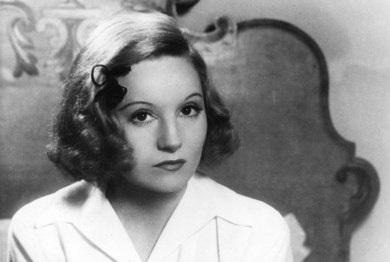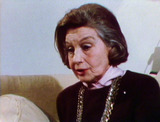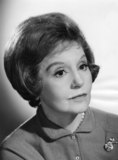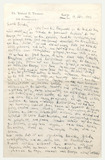Elisabeth Bergner(Elisabeth Ettel)
Es kam zur Premiere, und da habe ich sehr viel natürlich gehört schon von Hitler und diesen Sachen, hab immer gelacht, ich habe das nicht einen Augenblick ernst genommen. Ich glaube, ich hab die Deutschen für zu intelligent gehalten, zu wach.
[The premiere came and I had naturally heard a lot about Hitler and those things, and I just laughed, I didn’t take it seriously for an instant. I think I thought the Germans were too intelligent, too aware. (ed. trans.)]
Elisabeth Bergner in the documentary film Die Bergner: Erfahrungen einer großen Schauspielerin, 1975
| Born | on 22 August 1897 in Drohobycz, Austria-Hungary, now Ukraine |
|---|---|
| Died | on 12 May 1986 in London, Great Britain (United Kingdom) |
| Exile | Austria, Great Britain (United Kingdom), United States of America |
| Remigration | Federal Republic of Germany |
| Profession | Actress |
Elisabeth Bergner's success on the stage began with Max Reinhardt’s production of As You Like It on 25 April 1923: “Bergner! Bergner! cheered the gallery. And those of us who were there bowed our heads and blessed her and wished her all the best. Praying that God would preserve her, so young, so beautiful, so fair. And that film would stay away from her...”, wrote Kurt Tucholsky later in Die Weltbühne.
Raised and trained in Vienna, after stints in Zurich, Vienna and Munich Elisabeth Bergner was a major player in the Berlin theatre scene for 10 years from 1922. A regular in roles of vulnerable yet boyish women, she also played in silent films, usually directed by Paul Czinner. She worked with Conrad Veidt and Alexander Granach and was not interested in politics. When she was advised by the direction of the Staatliches Schauspielhaus that as a Jew she should act in the Jewish theatre, she simply didn’t return after a film job with Alexander Korda in London. Elisabeth Bergner was among the actors who found work during the War years and in English. In London she played in film and theatre roles, and after the beginning of the War she moved to the US. There her successes came primarily on the stage in New York; the anti-Nazi film Paris Calling (USA 1941, direction: Edwin L. Marin) would remain her only US film. She was involved in exile circles and along with Bertolt Brecht, Erwin Piscator and Lion Feuchtwanger was among the signees of the manifesto of the Council for a Democratic Germany in 1944. In 1951 she returned to London and accepted individual roles in West Germany in the following years. She remained based in London until her death.
Selected works:
Film: Der träumende Mund (D 1932, directed by Paul Czinner)
Film: Stolen Life (GB 1939, directed by Paul Czinner)
Theatre: William Shakespeare: As You like it, directed by Max Reinhardt, première: 25 April 1923, Deutsches Theater Berlin
Theatre: George Bernard Shaw: Saint Joan, directed by Max Reinhardt, première: 14 October 1924, Deutsches Theater Berlin
Theatre: Bryher (Annie Winifred Ellerman): Escape Me Never, directed by Theodore Komisarjevsky, première: 21 November 1933, Opera House, Manchester
Further reading:
Bergner, Elisabeth: Unordentliche Erinnerungen. Berlin: Henschel 1987
Heymann, Margret: Elisabeth Bergner – mehr als eine Schauspielerin. Berlin: vorwerk8 2008
Völker, Klaus: Elisabeth Bergner: das Leben einer Schauspielerin – ganz und doch immer unvollendet. Hrsg.: Akademie der Künste Berlin. Berlin: Edition Hentrich 1990




